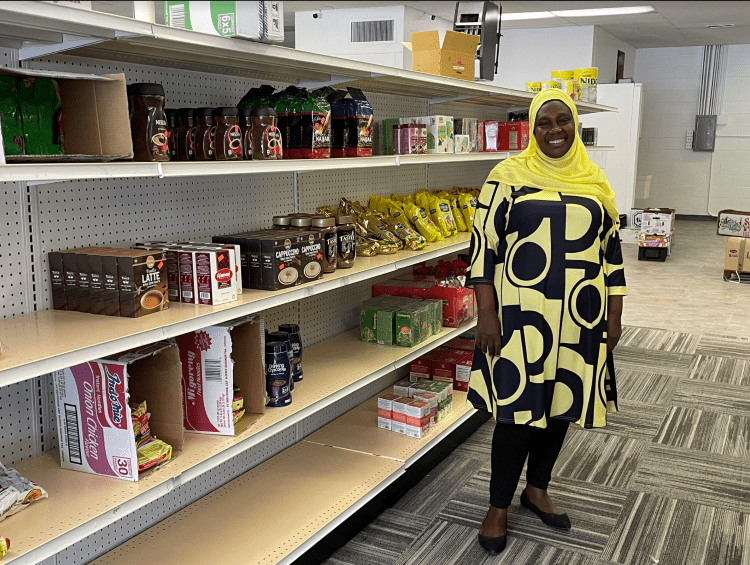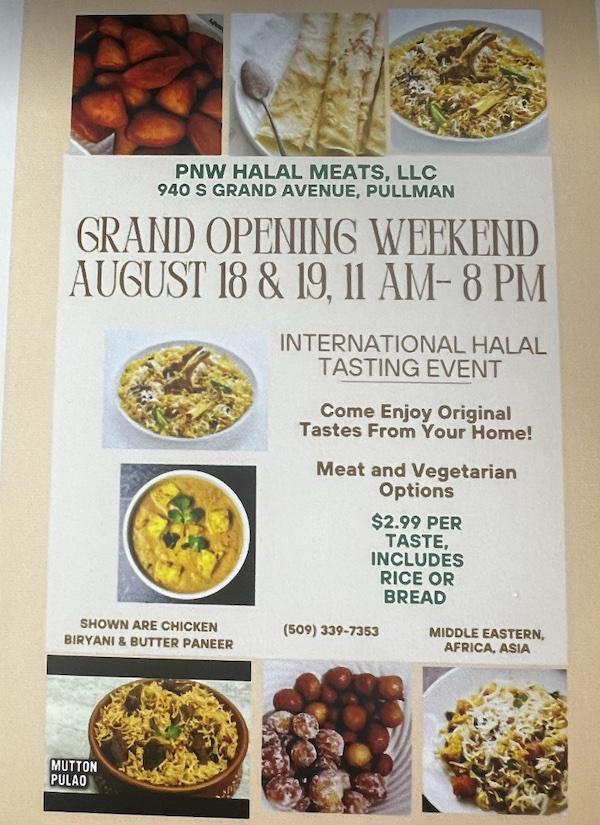Fostering Community Through Food: Inside the Only Halal Store in Southeastern Washington
Contributions from FāVS from readers like you make this news story possible. Thank you.
News Story by Tracy Simmons | Religion Unplugged
Sandwiched between a laundromat and an appliance shop, is the only halal store in the southeastern Washington and central Idaho area known as The Palouse.
“Hello brother!” Shamsa Njagi calls out as customers come in one after another, often picking up one item at a time. Ginger paste, Sona Masoori Rice or paneer are some of the most popular.
Until June, PNW Halal Meats, LLC, had been hidden away on the northwest side of town in Pullman, Washington, close to the Washington State University campus. The store was cramped with a confined parking lot, easy to miss if one wasn’t looking for it.
But its new location on Grand Avenue, one of the city’s busiest streets, comes with increased visibility, plenty of parking, room to grow and more community interest.

“We are seeing more people coming in. People don’t necessarily come in and buy, people also want to come in and check, which is a plus, plus, plus,” said Njagi, who immigrated to the U.S from Kenya in 2013.
She said many new customers are surprised to learn Pullman has an international store, and even more surprised to know it’s been open for more than a decade.
Njagi and her husband, Ali Ali, were both working there part time when the previous owner, Mohammed R. Islam, asked if they’d like to take it over.
That was right before the COVID-19 pandemic.
Ali and Njagi both now run the store and work full time at Schweitzer Engineering Laboratories.
Things weren’t too bad, Njagi said about taking over the store at the height of the pandemic, until the students left, leaving Pullman a ghost town.
“We didn’t have sales,” Njagi recalled. “It was a hard time.”
Pullman nearly doubles in size when school is in session, including about 2,000 international students.
And, according to 2020 data from The Association of Religion Data Archives, less than 100 Muslims live in the county, though that doesn’t track students.
Njagi said when the students left, they turned to local farmers for help.
“They’re the same people we’ve always been buying from. We cherish buying from the local community. We empower each other,” she said.
The farmers provided lamb and goat to the halal store, letting Njagi pay them for the meat later, once it was sold.
Today the store doesn’t operate on an I-owe-you basis with local farmers, but does rely on the farmers to deliver the livestock to the WSU campus, a USDA meat processor, for slaughter.
Ali does the slaughter.
“It’s like training you get from your mother,” Njagi said about the halal slaughtering process. “It’s just passed down, and you know that is what you’re supposed to do.”
R. Brian Siebeking, assistant professor of religious studies at Gonzaga University in Spokane, explained two things must happen for meat to be considered halal (which means permissible Arabic). Haram, in comparison, means “that which is prohibited.”
“First, it must be from an animal that is permissible to eat. Most livestock are permissible, with the notable exception of pigs,” he said. “Second, the animal must be slaughtered in a particular way: a sharp knife is used to cut the windpipe, carotid artery, and jugular vein in one, swift motion while saying a short blessing called the tasmiyah, which translates to ‘In the name of God, God is greatest.’”
This method of slaughter, he said, is intended to minimize the suffering of the animal as it quickly bleeds out.
“You don’t stress an animal before you slaughter them, that’s why it’s high quality meat,” Njagi added, noting that non-Muslims on the Palouse also come to the store to buy fresh halal meat.
Michelle Reynolds, who raises goats on the edge of Moscow, Idaho, began selling her goats to PNW Halal Meats, LLC last year.
“They’ve been great and easy to work with,” she said.
This year she had “13 mammas” and raised 30 kids. About 15 of them will be sold to the halal store.
She said in working with the grocery store, her family’s been learning about the halal process and Islam.
“Me and my husband talked about knowing when their holidays are so that we can fit our breeding schedule in and around that, to help support those times that are in higher demand,” she said. “ And not just Islam, but the international calendar.”
During Eid al-Adha, for example, Muslims sacrifice livestock to commemorate the story in the Quran, where Prophet Ibrahim was commanded by God to sacrifice his son Ismail.
One third of their meat is consumed by the family offering the sacrifice, one third is given to the family’s neighbors and the other third is distributed to those in need, Njagi explained.
Reynolds works full time at Pullman Regional Hospital where she has many international co-workers and said she’s noticed the halal store is meeting a demand.
“There is a need for their store. I have a lot of international coworkers and I know that they appreciate having food sources, mostly spices and different things that are native to where they’re from. Our selection here is very limited, right? Walmart. So I know they appreciate having a source for things that they can’t find at a regular grocery store,” she said.
Irebami Olaniran is one of those customers.
Originally from Nigeria, she came to Pullman to study computer science at WSU.
She said with two colleges within 8 miles of each other (University of Idaho is next door in Moscow, Idaho), there’s more diversity on the Palouse than meets the eye, making the store a resource for the community. She finds herself shopping at PNW Halal Meats for goat meat, basmati rice and vegetables from home.
This August she hopes people will be coming into the store to also shop for “Afro hair supplies.”
In the back corner of the vast store, she’ll soon be opening up Her Haven Beauty, which until now has been an online store that sells hair products, wigs and extensions for Black customers, as well as nails and lashes.
“There’s no resources for us here in Pullman. The closest is Spokane, an hour and a half away,” she said. “There’s a need, especially during the school year. I want to be a resource for people like me.”
She said she hopes her shop inside the halal store will be a gathering place for people of minority to socialize and build community.
Njagi said that’s what it’s all about.
“We should have a community where we can be able to support each other and be able to live a peaceful and dignified life. I think it’s from helping each other that you understand each other. Right?,” she said. “If you’re able to help someone that means you’re able to talk to them, that means you’re able to understand what they’re going through. And then they know you understand them.”
In a small town like Pullman, she said that’s especially important. That’s why she and Ali will drive five hours one-way to Seattle or Portland on the weekends and bring back international goods that her customers have requested. They’re considering adding a Hispanic selection to the store as well.
“We are taught in Islam when you die, when God will question what you did, the first question he will ask you is what you did to your neighbor; not what you did to your mother, not what you did to your father, not what you did to your children,” she said. “I will always say hello to my neighbors and to people who are close to me. And even if you don’t say hello back, I’ll still say hello tomorrow.”
Mark Your Calendar
On Aug. 18 and 19 PNW Halal Meats LLC will have an International Tasting Event from 11 a.m. – 8 p.m.
This story was originally published by Religion Unplugged.







